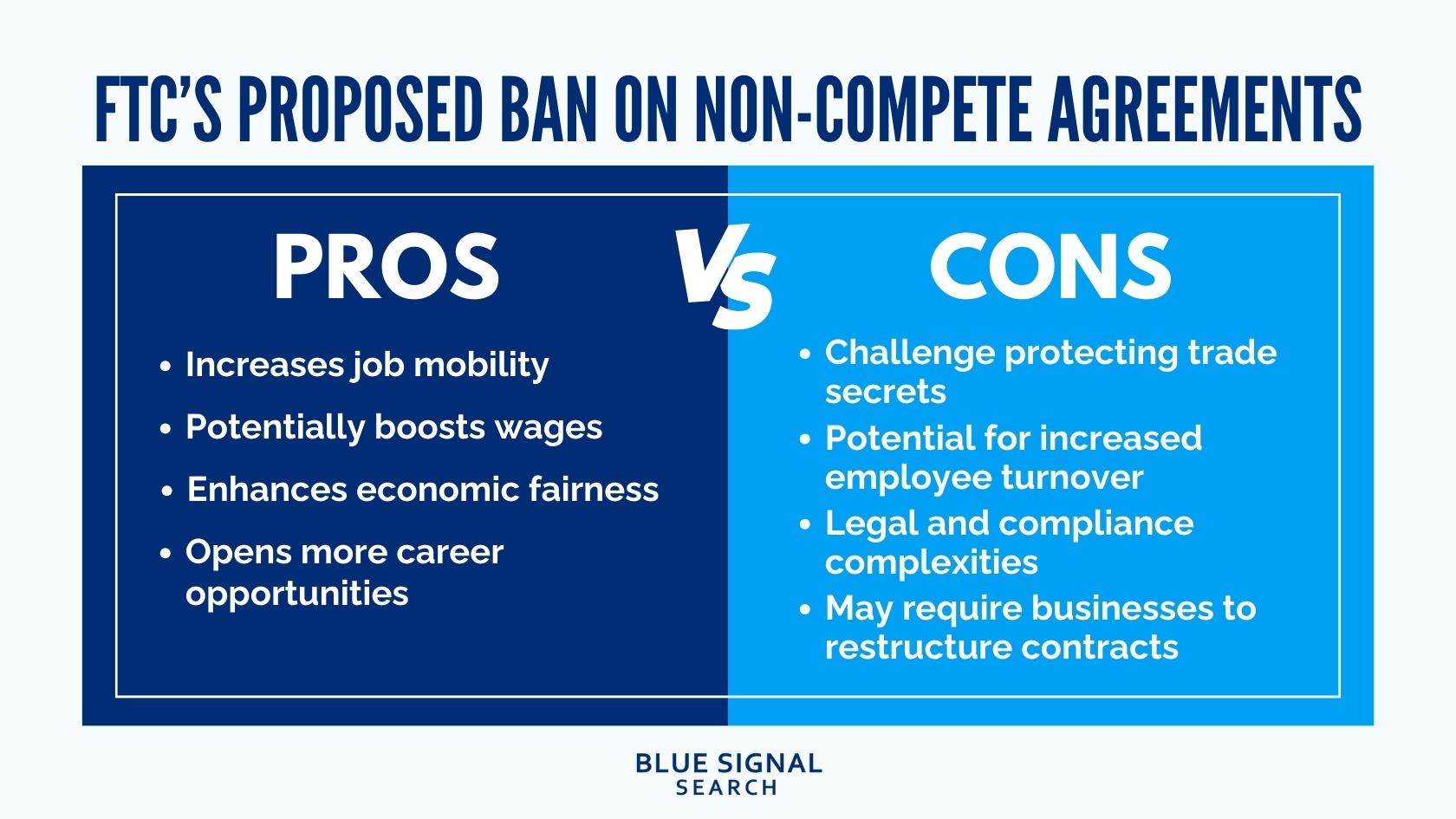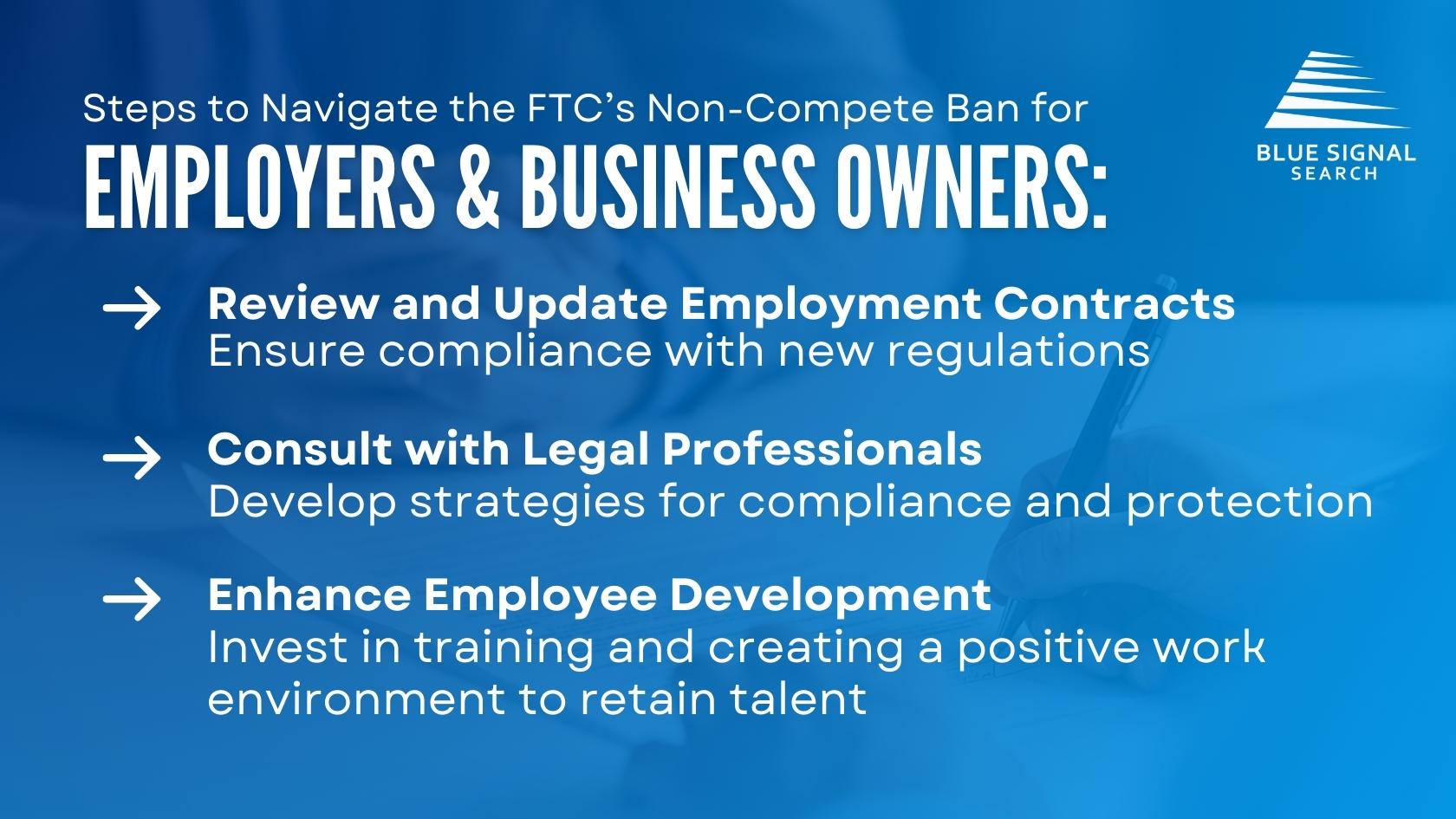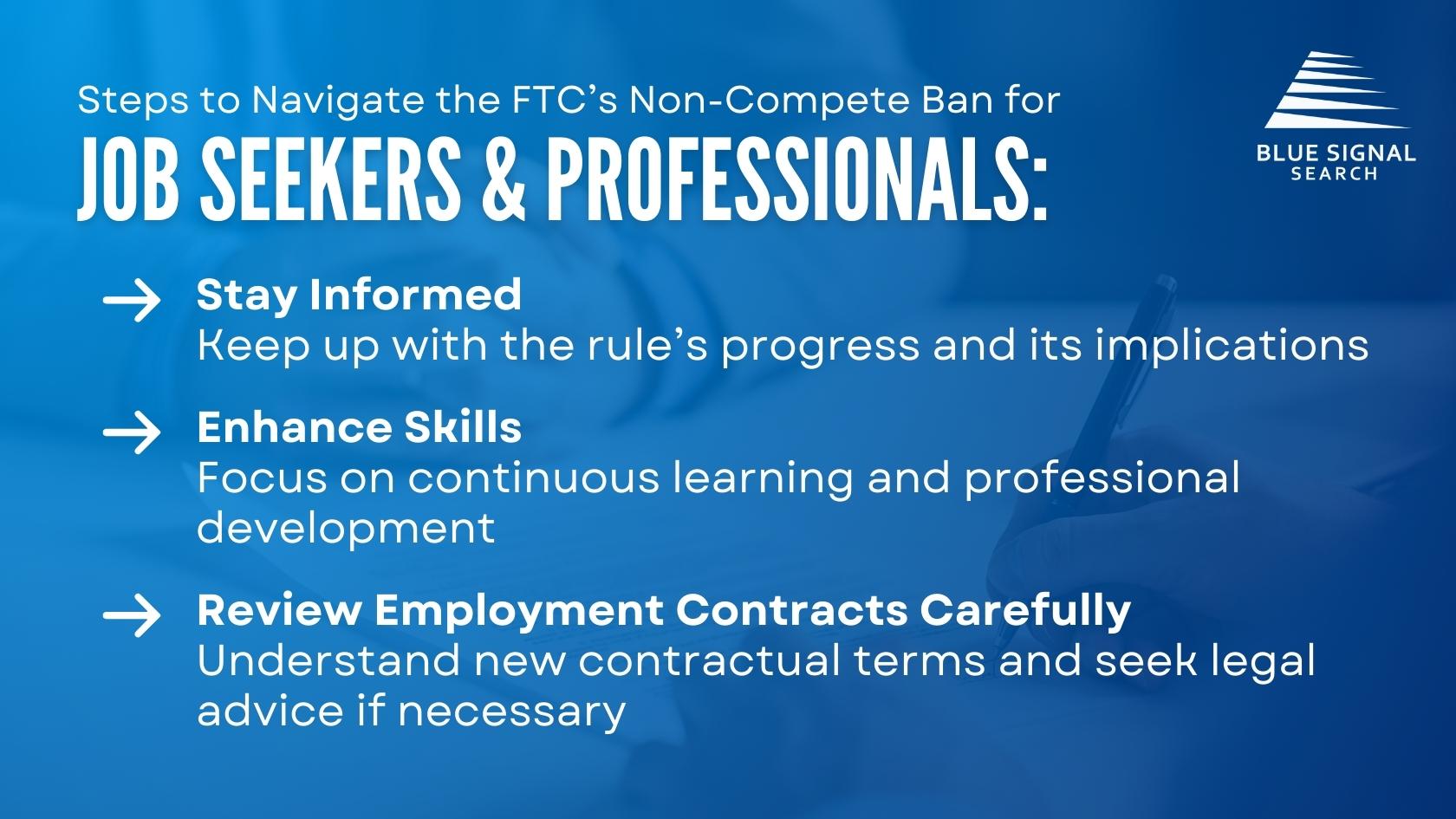The FTC's new legislation banning non-compete agreements has stirred quite a bit of conversation in the business world. As a recruiting firm, we understand the uncertainty this brings for both employers and job seekers. Our goal is to provide you with clear, factual information and practical advice to help you navigate this transition smoothly. Whether you're concerned about protecting your business or excited about new career opportunities, we're here to support you every step of the way.
What Are Non-Compete Agreements?
Non-compete agreements are contracts that restrict employees from joining or starting competing businesses within a specific time frame and geographical area after leaving a company. According to Cornell Law School, these agreements are designed to protect employers from potential competitive harm by former employees. Employers use non-compete agreements to safeguard sensitive information, maintain customer relationships, and preserve a competitive edge.
For many businesses, non-compete agreements serve as a vital tool. They ensure that employees do not leverage proprietary knowledge or connections for the benefit of a competitor. These agreements can be particularly crucial in industries where innovation and trade secrets play a significant role. By preventing employees from immediately joining rival firms, companies aim to protect their investments in training and development.
However, non-compete agreements can have a substantial impact on employees. They can limit job mobility, making it challenging for individuals to find new opportunities in their field. For workers, this restriction can mean staying in positions that are no longer a good fit or relocating to find work outside the restricted area. Additionally, employees may not fully understand the implications of these agreements when signing them, often believing they are unenforceable.
Given the complexities and controversies surrounding non-compete agreements, it's no surprise that the FTC has stepped in to propose changes. In the next section, we’ll break down the new legislation and what it means for both employers and job seekers.
The FTC’s New Legislation for Non-Compete Agreements

The Federal Trade Commission (FTC) has proposed a rule to ban non-compete agreements nationwide. This rule aims to address concerns that non-compete clauses limit job mobility, reduce wages, and stifle innovation. According to the FTC, eliminating non-compete agreements could significantly boost wages and expand career opportunities for millions of workers.
The proposed rule outlines several key provisions. It seeks to prohibit employers from entering into non-compete clauses with their workers, regardless of the worker's income or job function. Additionally, it would require employers to rescind existing non-compete agreements and notify current and former employees that these clauses are no longer in effect. The FTC believes that this broad approach will enhance job mobility and economic fairness, particularly benefiting lower-wage workers who are often disproportionately affected by such agreements. However, this proposal is not without controversy, and its path to implementation will likely be complex and contentious.
Legal Challenges
The proposed rule is expected to face several legal challenges from businesses and industry groups. These entities argue that non-compete agreements are crucial for protecting trade secrets, proprietary information, and investments in employee training. According to CNN, multiple lawsuits have already been filed against the FTC's proposal. Notably, the U.S. Chamber of Commerce has initiated a lawsuit, arguing that the ban exceeds the FTC’s authority. Recently, a U.S. judge paused this legal challenge, indicating that the legal process will be lengthy and complex.
This pause in the legal challenge is related to a lawsuit filed by Ryan LLC, which argues that the ban could negatively impact business operations and competitiveness. In addition, the Society for Human Resource Management (SHRM) has also filed a lawsuit against the rule. SHRM supports allowing well-structured non-competes, arguing that a blanket ban could harm businesses and workers alike. These legal battles are expected to significantly delay the rule's implementation and will shape the final form of the regulation.
Possible Compromises
As the rule goes through the legal and public commentary process, potential compromises may emerge. One possible compromise is to allow non-compete agreements for higher-wage employees while banning them for lower-wage workers. This approach aims to protect vulnerable workers while still enabling companies to protect their interests at higher levels of the organization. Another potential adjustment could be the introduction of stricter requirements for non-compete agreements, such as limiting their duration or geographical scope.
Future Outlook
The future of the FTC's proposed ban on non-compete agreements remains uncertain. The public comment period, followed by potential legal battles, means that the final implementation of the rule could take years. During this time, employers and employees must stay informed about developments and prepare for potential changes. Businesses should consider alternative methods to protect their interests, such as non-disclosure agreements or other contractual provisions that do not restrict employee mobility.
Implications for Employers and Business Owners
The proposed ban on non-compete agreements by the FTC presents both opportunities and challenges for employers and business owners. Understanding these implications is crucial for adapting to the potential changes in the legal landscape.

Positive Aspects
- Increased Talent Pool: With non-compete agreements removed, employers could have access to a larger pool of candidates. This increase in talent availability can be beneficial, especially in competitive industries where finding skilled workers is often challenging.
- Enhanced Innovation and Collaboration: The removal of non-competes could lead to greater collaboration and innovation within industries. Employees would be able to move more freely between companies, bringing new ideas and perspectives that can drive innovation.
Challenges
- Protecting Proprietary Information: One of the primary concerns for employers is the protection of trade secrets and proprietary information. Without non-compete agreements, businesses will need to find alternative methods to safeguard sensitive information. This might involve strengthening non-disclosure agreements (NDAs) and other confidentiality measures.
- Retention Strategies: Employers may need to develop new strategies to retain top talent. Without the security of non-compete agreements, businesses might face increased employee turnover. Enhancing employee engagement, improving workplace culture, and offering competitive compensation packages can help mitigate this risk.
Strategies to Safeguard Business Interests
- Non-Disclosure Agreements (NDAs): NDAs can be a critical tool in protecting confidential information. By clearly defining what constitutes confidential information and outlining the consequences of breaches, employers can mitigate the risks associated with the absence of non-compete clauses.
- Non-Solicitation Agreements: These agreements can prevent former employees from soliciting clients or employees from their previous company, thereby protecting business relationships and the workforce.
- Trade Secret Protection: Implementing robust policies and procedures to protect trade secrets is essential. This includes regular training for employees on the importance of confidentiality and the legal ramifications of disclosing proprietary information.
Employers need to stay informed about the progress of the FTC's proposed rule and proactively adapt their employment practices. This includes reviewing and updating employment contracts to ensure compliance, consulting with legal professionals to develop strategies for protection and compliance, and focusing on employee development to retain talent and reduce dependency on non-compete agreements.
Implications for Job Seekers
The FTC's proposed ban on non-compete agreements could have significant positive impacts on job seekers, enhancing their career opportunities and mobility. Understanding these implications will help job seekers navigate the potential changes in the job market.

Positive Aspects
- Increased Job Mobility: Without non-compete agreements, job seekers would have greater freedom to move between jobs without legal constraints. This increased mobility can lead to better career opportunities and the ability to find roles that are a better fit for their skills and aspirations.
- Enhanced Negotiation Power: The absence of non-compete agreements can enhance job seekers' negotiation power. They would be able to leverage offers from multiple employers without the fear of violating a non-compete clause, potentially leading to higher wages and better job terms.
- More Opportunities: Job seekers would have access to a broader range of opportunities, as employers would no longer be restricted by non-compete agreements in hiring individuals who previously worked for competitors. This can be especially beneficial in industries where talent shortages exist.
Challenges
- Increased Competition: While job mobility increases, job seekers might face increased competition for positions as more individuals are free to apply for the same roles. This could make the job market more competitive, requiring job seekers to differentiate themselves more effectively.
- Understanding New Employment Agreements: As non-compete agreements are phased out, employers may introduce other contractual clauses such as non-disclosure agreements (NDAs) and non-solicitation agreements. Job seekers need to educate themselves to understand these new terms and their implications fully.
Navigating the New Landscape
- Stay Informed: Job seekers should stay informed about the progress of the FTC's proposed rule and understand the new legal landscape as it evolves. Keeping abreast of changes will help them make informed decisions about their career moves.
- Enhance Skills: In a potentially more competitive job market, job seekers should focus on enhancing their skills and qualifications. This could involve pursuing additional certifications, engaging in continuous learning, and staying updated with industry trends.
- Review Employment Contracts Carefully: With the shift from non-compete agreements to other types of contractual clauses, it is crucial for job seekers to review employment contracts carefully. Seeking legal advice when necessary can help ensure they understand and are comfortable with the terms.
The proposed ban on non-compete agreements could lead to a more dynamic and open job market. Job seekers should take advantage of this by exploring new opportunities, negotiating better terms, and pursuing roles that align with their career goals. By understanding the implications of the proposed changes, they can navigate the evolving job market more effectively and make decisions that benefit their careers.
Engaging in Constructive Conversations
The FTC's proposed ban on non-compete agreements represents a significant shift in employment law, and fostering open dialogue between employers and employees is essential during this transition. Businesses should engage with their teams to discuss the implications of these changes and explore ways to adapt collectively. By maintaining transparent communication, companies can address concerns and develop strategies to protect their interests while supporting employee mobility.
Job seekers and employers alike can benefit from partnering with third-party recruiters like Blue Signal Search. Our recruiters are experts in the job market and stay updated on the latest regulatory changes, including the FTC's proposed ban on non-compete agreements. This in-depth knowledge enables us to provide valuable insights and tailored guidance to help both parties navigate the evolving landscape. Leveraging our expertise can ease the transition, ensuring that both employers and employees are well-prepared for the changes ahead.
Conclusion
In conclusion, the FTC's proposed ban on non-compete agreements could reshape the employment landscape, presenting new opportunities and challenges for both employers and job seekers. While the rule's implementation may be delayed due to legal battles, staying informed and proactive is crucial. By understanding the potential impacts and adapting accordingly, businesses and individuals can navigate this evolving landscape successfully.
Stay tuned to our updates for the latest developments on this topic. For personalized guidance on navigating these changes or any of your hiring needs, feel free to contact Blue Signal Search. We're here to help you make the most of the opportunities ahead.
Partner with us for your next hire.
Set up a free consultation with a recruiting manager. Tell us about your hiring need.
By submitting this form, you consent to receive communications from Blue Signal, including phone calls, emails, and text messages.
